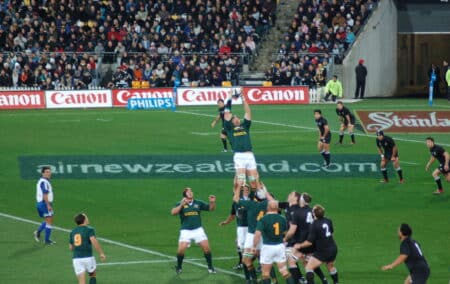The Springboks are the clearest example of why institutions matter in this country. Even as social media and legacy media debate around “token” players and even transformation, the much larger and more important point is missed; many of the players who play for the Springboks, regardless of colour, come from a small select sample of excellent educational institutions with a heritage of producing good rugby players or what might be called institutional memory.
It misses the point to celebrate the black faces in the Springbok team without understanding that fundamentally speaking, they are the result of a small pocket of institutional excellence that is not available to the majority of South Africans. The same goes for the national cricket team where Lungi Ngidi attended Hilton College, Andile Phehlukwayo attended Glenwood High, and KG Rabada attended St Stithian’s, and so on.
Affluence and poverty
These institutions are part of the reason why affluence in South Africa has been deracialized but poverty has not. It is a subtle distinction but an important one. Even as post-apartheid South Africa has seen a rise in the black middle class, admittedly in part due to government policies, the majority of black South Africans are still in the grips of penury. Even the black middle class is precarious, because those initial government policies have not been buttressed by a commitment to building institutions that reproduce excellence, competence, and skill at a much higher level. You can only bloat the civil service so much until the whole thing starts to fall apart.
I am someone who grew up in the former Transkei, a place that had good schools, working hospitals, functioning public services, and working roads and infrastructure manned by black people. I find it unfortunate that to say merit-based appointments matter in building institutions and institutional memory often comes across as code for ‘get more white people in there’. The point does stand, though, as we have seen with the erosion of our municipalities across the country, where political appointees and patronage have resulted in vital infrastructure falling apart, roads becoming barely usable, and services stalling.
South Africa has no true path to transforming the economy, beating the middle income trap and becoming a developed nation without a heightened focus on doing the difficult work of building up institutions and apparatus that will allow more and more of our population to flourish. This requires a commitment to merit-based appointments, ditching overly-racialized politics, and a social contract that is cognisant of our demographic realities. If more and more black people do well, if more and more excellent institutions are built and maintained, the better everyone else and this country will do.
Indictment
The greatest indictment on the ANC is how they’ve allowed – through grift, patronage, and corruption – even functioning institutions to corrode and fall apart. Cities like Mthatha and Rustenburg in former homelands stand as testament to that. A nation without functioning institutions is a nation bound to fail.
Development scholars James A. Robinson and Daron Acemoglu zero in on this, and focus on the historical currents and critical junctures that mould modern political economies: the processes that produce political and economic institutions that can be either inclusive — focused on power-sharing, productivity, education, technological advances and the well-being of the nation as a whole; or extractive — bent on grabbing wealth and resources away from one part of society to benefit another.
To understand what extractive institutions look like, consider les Grosses Legumes (the Big Vegetables), the sardonic Congolese nickname for the obscenely pampered clique around Mobutu Sese Seko, the strongman who ruled what is now the Democratic Republic of the Congo from 1965 to 1997. When Mobutu decreed that he wanted a palace built for himself at his birthplace, he made sure that the airport had a landing strip big enough to accommodate the Concordes he liked to rent from Air France. Mobutu and the Big Vegetables weren’t interested in developing Congo. They were interested in strip-mining it and sucking out its vast mineral wealth for themselves.
Goes back centuries
But the roots of Congo’s nightmarish poverty and strife go back centuries. Before the arrival of European imperialists, what was then known as the Kingdom of Kongo was ruled by the oligarchic forerunners of the Big Vegetables, who drew their staggering wealth from arbitrary taxation and a busy slave trade. And when the European colonists showed up, they made a dreadful situation even worse — especially under the rapacious rule of King Leopold II of Belgium.
When Congo finally won its independence in 1960, it was a feeble, decentralized state burdened with a predatory political class and exploitative economic institutions — too weak to deliver basic services but just strong enough to keep Mobutu and his cronies on top; too poor to provide for its citizenry but just wealthy enough to give elites something to fight over.
This isn’t unlike the fierce and deadly political battles fought within South Africa’s ruling party over which factions get to strip the state’s coffers bare and benefit from extractive patronage networks. Political assassinations in KwaZulu-Natal are particularly common, as different factions vie for this unearned wealth. These battles will intensify leading up to the ANC’s elective conference in December.
Ultimately, for South Africa to broadly prosper, institutions must prioritize education, technological advancement, productivity, and power-sharing. Such institutions are upheld by merit-based appointments; by limiting the power of potentially rapacious elites including politicians, businesspeople that foster patronage networks and tribal authorities; by protecting property rights; and emphasizing a culture where the most gifted and capable can use their talents in ways they see fit, so as to benefit all of society.
The views of the writer are not necessarily the views of the Daily Friend or the IRR
If you like what you have just read, support the Daily Friend
Image: Hamish McConnochie, Attribution, via Wikimedia Commons

